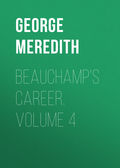
George Meredith
Vittoria. Complete
CHAPTER IV
It was a surprise to all of them, save to Agostino Balderini, who passed his inspecting glance from face to face, marking the effect of the announcement. Corte gazed at her heavily, but not altogether disapprovingly. Giulio Bandinelli and Marco Sana, though evidently astonished, and to some extent incredulous, listened like the perfectly trusty lieutenants in an enterprise which they were. But Carlo Ammiani stood horror-stricken. The blood had left his handsome young olive-hued face, and his eyes were on the signorina, large with amazement, from which they deepened to piteousness of entreaty.
“Signorina!—you! Can it be true? Do you know?—do you mean it?”
“What, signor Carlo?”
“This; will you venture to do such a thing?”
“Oh, will I venture? What can you think of me? It is my own request.”
“But, signorina, in mercy, listen and consider.”
Carlo turned impetuously to the Chief. “The signorina can’t know the danger she is running. She will be seized on the boards, and shut up between four walls before a man of us will be ready,—or more than one,” he added softly. “The house is sure to be packed for a first night; and the Polizia have a suspicion of her. She has been off her guard in the Conservatorio; she has talked of a country called Italy; she has been indiscreet;—pardon, pardon, signorina! but it is true that she has spoken out from her noble heart. And this opera! Are they fools?—they must see through it. It will never,—it can’t possibly be reckoned on to appear. I knew that the signorina was heart and soul with us; but who could guess that her object was to sacrifice herself in the front rank,—to lead a forlorn hope! I tell you it’s like a Pagan rite. You are positively slaying a victim. I beg you all to look at the case calmly!”
A burst of laughter checked him; for his seniors by many years could not hear such veteran’s counsel from a hurried boy without being shrewdly touched by the humour of it, while one or two threw a particular irony into their tones.
“When we do slay a victim, we will come to you as our augur, my Carlo,” said Agostino.
Corte was less gentle. As a Milanese and a mere youth Ammiani was antipathetic to Corte, who closed his laughter with a windy rattle of his lips, and a “pish!” of some emphasis.
Carlo was quick to give him a challenging frown.
“What is it?” Corte bent his head back, as if inquiringly.
“It’s I who claim that question by right,” said Carlo.
“You are a boy.”
“I have studied war.”
“In books.”
“With brains, Colonel Corte.”
“War is a matter of blows, my little lad.”
“Let me inform you, signor Colonel, that war is not a game between bulls, to be played with the horns of the head.”
“You are prepared to instruct me?” The fiery Bergamasc lifted his eyebrows.
“Nay, nay!” said Agostino. “Between us two first;” and he grasped Carlo’s arm, saying in an underbreath, “Your last retort was too long-winded. In these conflicts you must be quick, sharp as a rifle-crack that hits echo on the breast-bone and makes her cry out. I correct a student in the art of war.” Then aloud: “My opera, young man!—well, it’s my libretto, and you know we writers always say ‘my opera’ when we have put the pegs for the voice; you are certainly aware that we do. How dare you to make calumnious observations upon my opera? Is it not the ripe and admirable fruit of five years of confinement? Are not the lines sharp, the stanzas solid? and the stuff, is it not good? Is not the subject simple, pure from offence to sensitive authority, constitutionally harmless? Reply!”
“It’s transparent to any but asses,” said Carlo.
“But if it has passed the censorship? You are guilty, my boy, of bestowing upon those highly disciplined gentlemen who govern your famous city—what title? I trust a prophetic one, since that it comes from an animal whose custom is to turn its back before it delivers a blow, and is, they remark, fonder of encountering dead lions than live ones. Still, it is you who are indiscreet,—eminently so, I must add, if you will look lofty. If my opera has passed the censorship! eh, what have you to say?”
Carlo endured this banter till the end of it came.
“And you—you encourage her!” he cried wrathfully. “You know what the danger is for her, if they once lay hands on her. They will have her in Verona in four-and-twenty hours; through the gates of the Adige in a couple of days, and at Spielberg, or some other of their infernal dens of groans, within a week. Where is the chance of a rescue then? They torture, too, they torture! It’s a woman; and insult will be one mode of torturing her. They can use rods—”
The excited Southern youth was about to cover his face, but caught back his hands, clenching them.
“All this,” said Agostino, “is an evasion, manifestly, of the question concerning my opera, on which you have thought proper to cast a slur. The phrase, ‘transparent to any but asses,’ may not be absolutely objectionable, for transparency is, as the critics rightly insist, meritorious in a composition. And, according to the other view, if we desire our clever opponents to see nothing in something, it is notably skilful to let them see through it. You perceive, my Carlo. Transparency, then, deserves favourable comment. So, I do not complain of your phrase, but I had the unfortunate privilege of hearing it uttered. The method of delivery scarcely conveyed a compliment. Will you apologize?”
Carlo burst from him with a vehement question to the Chief: “Is it decided?”
“It is, my friend,” was the reply.
“Decided! She is doomed! Signorina! what can you know of this frightful risk? You are going to the slaughter. You will be seized before the first verse is out of your lips, and once in their clutches, you will never breathe free air again. It’s madness!—ah, forgive me!—yes, madness! For you shut your eyes; you rush into the trap blindfolded. And that is how you serve our Italy! She sees you an instant, and you are caught away;—and you who might serve her, if you would, do you think you can move dungeon walls?”
“Perhaps, if I have been once seen, I shall not be forgotten,” said the signorina smoothly, and then cast her eyes down, as if she felt the burden of a little possible accusation of vanity in this remark. She raised them with fire.
“No; never!” exclaimed Carlo. “But, now you are ours. And—surely it is not quite decided?”
He had spoken imploringly to the Chief. “Not irrevocably?” he added.
“Irrevocably!”
“Then she is lost!”
“For shame, Carlo Ammiani;” said old Agostino, casting his sententious humours aside. “Do you not hear? It is decided! Do you wish to rob her of her courage, and see her tremble? It’s her scheme and mine: a case where an old head approves a young one. The Chief says Yes! and you bellow still! Is it a Milanese trick? Be silent.”
“Be silent!” echoed Carlo. “Do you remember the beast Marschatska’s bet?” The allusion was to a black incident concerning a young Italian ballet girl who had been carried off by an Austrian officer, under the pretext of her complicity in one of the antecedent conspiracies.
“He rendered payment for it,” said Agostino.
“He perished; yes! as we shake dust to the winds; but she!—it’s terrible! You place women in the front ranks—girls! What can defenceless creatures do? Would you let the van-regiment in battle be the one without weapons? It’s slaughter. She’s like a lamb to them. You hold up your jewel to the enemy, and cry, ‘Come and take it.’ Think of the insults! think of the rough hands, and foul mouths! She will be seized on the boards—”
“Not if you keep your tongue from wagging,” interposed Ugo Corte, fevered by this unseasonable exhibition of what was to him manifestly a lover’s frenzied selfishness. He moved off, indifferent to Carlo’s retort. Marco Sana and Giulio Bandinelli were already talking aside with the Chief.
“Signor Carlo, not a hand shall touch me,” said the signorina. “And I am not a lamb, though it is good of you to think me one. I passed through the streets of Milan in the last rising. I was unharmed. You must have some confidence in me.”
“Signorina, there’s the danger,” rejoined Carlo. “You trust to your good angels once, twice—the third time they fail you! What are you among a host of armed savages? You would be tossed like weed on the sea. In pity, do not look so scornfully! No, there is no unjust meaning in it; but you despise me for seeing danger. Can nothing persuade you? And, besides,” he addressed the Chief, who alone betrayed no signs of weariness; “listen, I beg of you. Milan wants no more than a signal. She does not require to be excited. I came charged with several proposals for giving the alarm. Attend, you others! The night of the Fifteenth comes; it is passing like an ordinary night. At twelve a fire-balloon is seen in the sky. Listen, in the name of saints and devils!”
But even the Chief was observed to show signs of amusement, and the gravity of the rest forsook them altogether at the display of this profound and original conspiratorial notion.
“Excellent! excellent! my Carlo,” said old Agostino, cheerfully. “You have thought. You must have thought, or whence such a conception? But, you really mistake. It is not the garrison whom we desire to put on their guard. By no means. We are not in the Imperial pay. Probably your balloon is to burst in due time, and, wind permitting, disperse printed papers all over the city?”
“What if it is?” cried Carlo fiercely.
“Exactly. I have divined your idea. You have thought, or, to correct the tense, are thinking, which is more hopeful, though it may chance not to seem so meritorious. But, if yours are the ideas of full-blown jackets, bear in mind that our enemies are coated and breeched. It may be creditable to you that your cunning is not the cunning of the serpent; to us it would be more valuable if it were. Continue.”
“Oh! there are a thousand ways.” Carlo controlled himself with a sharp screw of all his muscles. “I simply wish to save the signorina from an annoyance.”
“Very mildly put,” Agostino murmured assentingly.
“In our Journal,” said Carlo, holding out the palm of one hand to dot the forefinger of the other across it, by way of personal illustration—“in our Journal we might arrange for certain letters to recur at distinct intervals in Roman capitals, which might spell out, ‘This Night AT Twelve,’ or ‘At Once.’”
“Quite as ingenious, but on the present occasion erring on the side of intricacy. Aha! you want to increase the sale of your Journal, do you, my boy? The rogue!”
With which, and a light slap over Carlo’s shoulder, Agostino left him.
The aspect of his own futile proposals stared the young man in the face too forcibly for him to nurse the spark of resentment which was struck out in the turmoil of his bosom. He veered, as if to follow Agostino, and remained midway, his chest heaving, and his eyelids shut.
“Signor Carlo, I have not thanked you.” He heard Vittoria speak. “I know that a woman should never attempt to do men’s work. The Chief will tell you that we must all serve now, and all do our best. If we fail, and they put me to great indignity, I promise you that I will not live. I would give this up to be done by anyone else who could do it better. It is in my hands, and my friends must encourage me.”
“Ah, signorina!” the young man sighed bitterly. The knowledge that he had already betrayed himself in the presence of others too far, and the sob in his throat labouring to escape, kept him still.
A warning call from Ugo Corte drew their attention. Close by the chalet where the first climbers of the mountain had refreshed themselves, Beppo was seen struggling to secure the arms of a man in a high-crowned green Swiss hat, who was apparently disposed to give the signorina’s faithful servant some trouble. After gazing a minute at this singular contention, she cried—“It’s the same who follows me everywhere!”
“And you will not believe you are suspected,” murmured Carlo in her ear.
“A spy?” Sana queried, showing keen joy at the prospect of scotching such a reptile on the lonely height. Corte went up to the Chief. They spoke briefly together, making use of notes and tracings on paper. The Chief then said “Adieu” to the signorina. It was explained to the rest by Corte that he had a meeting to attend near Pella about noon, and must be in Fobello before midnight. Thence his way would be to Genoa.
“So, you are resolved to give another trial to our crowned ex-Carbonaro,” said Agostino.
“Without leaving him an initiative this time!” and the Chief embraced the old man. “You know me upon that point. I cannot trust him. I do not. But, if we make such a tide in Lombardy that his army must be drawn into it, is such an army to be refused? First, the tide, my friend! See to that.”
“The king is our instrument!” cried Carlo Ammiani, brightening.
“Yes, if we were particularly well skilled in the use of that kind of instrument,” Agostino muttered.
He stood apart while the Chief said a few words to Carlo, which made the blood play vividly across the visage of the youth. Carlo tried humbly to expostulate once or twice. In the end his head was bowed, and he signified a dumb acquiescence.
“Once more, good-bye.” The Chief addressed the signorina in English.
She replied in the same tongue, “Good-bye,” tremulously; and passion mounting on it, added—“Oh! when shall I see you again?”
“When Rome is purified to be a fit place for such as you.”
In another minute he was hidden on the slope of the mountain lying toward Orta.
CHAPTER V
Beppo had effected a firm capture of his man some way down the slope. But it was a case of check that entirely precluded his own free movements. They hung together intertwisted in the characters of specious pacificator and appealing citizen, both breathless.
“There! you want to hand me up neatly; I know your vanity, my Beppo; and you don’t even know my name,” said the prisoner.
“I know your ferret of a face well enough,” said Beppo. “You dog the signorina. Come up, and don’t give trouble.”
“Am I not a sheep? You worry me. Let me go.”
“You’re a wriggling eel.”
“Catch me fast by the tail then, and don’t hold me by the middle.”
“You want frightening, my pretty fellow!”
“If that’s true, my Beppo, somebody made a mistake in sending you to do it. Stop a moment. You’re blown. I think you gulp down your minestra too hot; you drink beer.”
“You dog the signorina! I swore to scotch you at last.”
“I left Milan for the purpose—don’t you see? Act fairly, my Beppo, and let us go up to the signorina together decently.”
“Ay, ay, my little reptile! You’ll find no Austrians here. Cry out to them to come to you from Baveno. If the Motterone grew just one tree! Saints! one would serve.”
“Why don’t you—fool that you are, my Beppo!—pray to the saints earlier? Trees don’t grow from heaven.”
“You’ll be going there soon, and you’ll know better about it.”
“Thanks to the Virgin, then, we shall part at some time or other!”
The struggles between them continued sharply during this exchange of intellectual shots; but hearing Ugo Corte’s voice, the prisoner’s confident audacity forsook him, and he drew a long tight face like the mask of an admonitory exclamation addressed to himself from within.
“Stand up straight!” the soldier’s command was uttered.
Even Beppo was amazed to see that the man had lost the power to obey or to speak.
Corte grasped him under the arm-pit. With the force of his huge fist he swung him round and stretched him out at arm’s length, all collar and shanks. The man hung like a mole from the twig. Yet, while Beppo poured out the tale of his iniquities, his eyes gave the turn of a twinkle, showing that he could have answered one whom he did not fear. The charge brought against him was, that for the last six months he had been untiringly spying on the signorina.
Corte stamped his loose feet to earth, shook him and told him to walk aloft. The flexible voluble fellow had evidently become miserably disconcerted. He walked in trepidation, speechless, and when interrogated on the height his eyes flew across the angry visages with dismal uncertainty. Agostino perceived that he had undoubtedly not expected to come among them, and forthwith began to excite Giulio and Marco to the worst suspicions, in order to indulge his royal poetic soul with a study of a timorous wretch pushed to anticipations of extremity.
“The execution of a spy,” he preluded, “is the signal for the ringing of joy-bells on this earth; not only because he is one of a pestiferous excess, in point of numbers, but that he is no true son of earth. He escaped out of hell’s doors on a windy day, and all that we do is to puff out a bad light, and send him back. Look at this fellow in whom conscience is operating so that he appears like a corked volcano! You can see that he takes Austrian money; his skin has got to be the exact colour of Munz. He has the greenish-yellow eyes of those elective, thrice-abhorred vampyres who feed on patriot-blood. He is condemned without trial by his villainous countenance, like an ungrammatical preface to a book. His tongue refuses to confess, but nature is stronger:—observe his knees. Now this is guilt. It is execrable guilt. He is a nasty object. Nature has in her wisdom shortened his stature to indicate that it is left to us to shorten the growth of his offending years. Now, you dangling soul! answer me:—what name hailed you when on earth?”
The fan, with no clearly serviceable tongue, articulated, “Luigi.”
“Luigi! the name Christian and distinctive. The name historic:-Luigi Porco?”
“Luigi Saracco, signore.”
“Saracco: Saracco: very possibly a strip of the posterity of cut-throat Moors. To judge by your face, a Moor undoubtedly: glib, slippery! with a body that slides and a soul that jumps. Taken altogether, more serpent than eagle. I misdoubt that little quick cornering eye of yours. Do you ever remember to have blushed?”
“No, signore,” said Luigi.
“You spy upon the signorina, do you?”
“You have Beppo’s word for that,” interposed Marco Sana, growling.
“And you are found spying on the mountain this particular day! Luigi Saracco, you are a fellow of a tremendous composition. A goose walking into a den of foxes is alone to be compared to you,—if ever such goose was! How many of us did you count, now, when you were, say, a quarter of a mile below?”
Marco interposed again: “He has already seen enough up here to make a rope of florins.”
“The fellow’s eye takes likenesses,” said Giulio.
Agostino’s question was repeated by Corte, and so sternly that Luigi, beholding kindness upon no other face save Vittoria’s, watched her, and muttering “Six,” blinked his keen black eyes piteously to get her sign of assent to his hesitated naming of that number. Her mouth and the turn of her head were expressive to him, and he cried “Seven.”
“So; first six, and next seven,” said Corte.
“Six, I meant, without the signorina,” Luigi explained.
“You saw six of us without the signorina! You see we are six here, including the signorina. Where is the seventh?”
Luigi tried to penetrate Vittoria’s eyes for a proper response; but she understood the grave necessity for getting the full extent of his observations out of him, and she looked as remorseless as the men. He feigned stupidity and sullenness, rage and cunning, in quick succession.
“Who was the seventh?” said Carlo.
“Was it the king?” Luigi asked.
This was by just a little too clever; and its cleverness, being seen, magnified the intended evasion so as to make it appear to them that Luigi knew well the name of the seventh.
Marco thumped a hand on his shoulder, shouting—“Here; speak out! You saw seven of us. Where has the seventh one gone?”
Luigi’s wits made a dash at honesty. “Down Orta, signore.”
“And down Orta, I think, you will go; deeper down than you may like.”
Corte now requested Vittoria to stand aside. He motioned to her with his hand to stand farther, and still farther off; and finally told Carlo to escort her to Baveno. She now began to think that the man Luigi was in some perceptible danger, nor did Ammiani disperse the idea.
“If he is a spy, and if he has seen the Chief, we shall have to detain him for at least four-and-twenty hours,” he said, “or do worse.”
“But, Signor Carlo,”—Vittoria made appeal to his humanity,—“do they mean, if they decide that he is guilty, to hurt him?”
“Tell me, signorina, what punishment do you imagine a spy deserves?”
“To be called one!”
Carlo smiled at her lofty method of dealing with the animal.
“Then you presume him to have a conscience?”
“I am sure, Signor Carlo, that I could make him loathe to be called a spy.”
They were slowly pacing from the group, and were on the edge of the descent, when the signorina’s name was shrieked by Luigi. The man came running to her for protection, Beppo and the rest at his heels. She allowed him to grasp her hand.
“After all, he is my spy; he does belong to me,” she said, still speaking on to Carlo. “I must beg your permission, Colonel Corte and Signor Marco, to try an experiment. The Signor Carlo will not believe that a spy can be ashamed of his name.—Luigi!”
“Signorina!”—he shook his body over her hand with a most plaintive utterance.
“You are my countryman, Luigi?”
“Yes, signorina.”
“You are an Italian?”
“Certainly, signorina!”
“A spy!”
Vittoria had not always to lift her voice in music for it to sway the hearts of men. She spoke the word very simply in a mellow soft tone. Luigi’s blood shot purple. He thrust his fists against his ears.
“See, Signor Carlo,” she said; “I was right. Luigi, you will be a spy no more?”
Carlo Ammiani happened to be rolling a cigarette-paper. She put out her fingers for it, and then reached it to Luigi, who accepted it with singular contortions of his frame, declaring that he would confess everything to her. “Yes, signorina, it is true; I am a spy on you. I know the houses you visit. I know you eat too much chocolate for your voice. I know you are the friend of the Signora Laura, the widow of Giacomo Piaveni, shot—shot on Annunciation Day. The Virgin bless him! I know the turning of every street from your house near the Duomo to the signora’s. You go nowhere else, except to the maestro’s. And it’s something to spy upon you. But think of your Beppo who spies upon me! And your little mother, the lady most excellent, is down in Baveno, and she is always near you when you make an expedition. Signorina, I know you would not pay your Beppo for spying upon me. Why does he do it? I do not sing ‘Italia, Italia shall be free!’ I have heard you when I was under the maestro’s windows; and once you sang it to the Signor Agostino Balderini. Indeed, signorina, I am a sort of guardian of your voice. It is not gold of the Tedeschi I get from the Signor Antonio Pericles.”
At the mention of this name, Agostino and Vittoria laughed out.
“You are in the pay of the Signor Antonio-Pericles,” said Agostino. “Without being in our pay, you have done us the service to come up here among us! Bravo! In return for your disinterestedness, we kick you down, either upon Baveno or upon Stresa, or across the lake, if you prefer it.—The man is harmless. He is hired by a particular worshipper of the signorina’s voice, who affects to have first discovered it when she was in England, and is a connoisseur, a millionaire, a Greek, a rich scoundrel, with one indubitable passion, for which I praise him. We will let his paid eavesdropper depart, I think. He is harmless.”
Neither Ugo nor Marco was disposed to allow any description of spy to escape unscotched. Vittoria saw that Luigi’s looks were against him, and whispered: “Why do you show such cunning eyes, Luigi?”
He replied: “Signorina, take me out of their hearing, and I will tell you everything.”
She walked aside. He seemed immediately to be inspired with confidence, and stretched his fingers in the form of a grasshopper, at which sight they cried: “He knows Barto Rizzo—this rascal!” They plied him with signs and countersigns, and speedily let him go. There ensued a sharp snapping of altercation between Luigi and Beppo. Vittoria had to order Beppo to stand back.
“It is a poor dog, not of a good breed, signorina,” Luigi said, casting a tolerant glance over his shoulder. “Faithful, but a poor nose. Ah! you gave me this cigarette. Not the Virgin could have touched my marrow as you did. That’s to be remembered by-and-by. Now, you are going to sing on the night of the fifteenth of September. Change that night. The Signor Antonio-Pericles watches you, and he is a friend of the Government, and the Government is snoring for you to think it asleep. The Signor Antonio-Pericles pacifies the Tedeschi, but he will know all that you are doing, and how easy it will be, and how simple, for you to let me know what you think he ought to know, and just enough to keep him comfortable! So we work like a machine, signorina. Only, not through that Beppo, for he is vain of his legs, and his looks, and his service, and because he has carried a gun and heard it go off. Yes; I am a spy. But I am honest. I, too, have visited England. One can be honest and a spy. Signorina, I have two arms, but only one heart. If you will be gracious and consider! Say, here are two hands. One hand does this thing, one hand does that thing, and that thing wipes out this thing. It amounts to clear reasoning! Here are two eyes. Were they meant to see nothing but one side! Here is a tongue with a line down the middle almost to the tip of it—which is for service. That Beppo couldn’t deal double, if he would; for he is imperfectly designed—a mere dog’s pattern! But, only one heart, signorina—mind that. I will never forget the cigarette. I shall smoke it before I leave the mountain, and think—oh!”
Having illustrated the philosophy of his system, Luigi continued: “I am going to tell you everything. Pray, do not look on Beppo! This is important. The Signor Antonio-Pericles sent me to spy on you, because he expects some people to come up the mountain, and you know them; and one is an Austrian officer, and he is an Englishman by birth, and he is coming to meet some English friends who enter Italy from Switzerland over the Moro, and easily up here on mules or donkeys from Pella. The Signor Antonio-Pericles has gold ears for everything that concerns the signorina. ‘A patriot is she!’ he says; and he is jealous of your English friends. He thinks they will distract you from your studies; and perhaps”—Luigi nodded sagaciously before he permitted himself to say—“perhaps he is jealous in another way. I have heard him speak like a sonnet of the signorina’s beauty. The Signor Antonio-Pericles thinks that you have come here to-day to meet them. When he heard that you were going to leave Milan for Baveno, he was mad, and with two fists up, against all English persons. The Englishman who is an Austrian officer is quartered at Verona, and the Signor Antonio Pericles said that the Englishman should not meet you yet, if he could help it.”
Victoria stood brooding. “Who can it be,—who is an Englishman, and an Austrian officer, and knows me?”
“Signorina, I don’t know names. Behold, that Beppo is approaching like the snow! What I entreat is, that the signorina will wait a little for the English party, if they come, so that I may have something to tell my patron. To invent upon nothing is most unpleasant, and the Signor Antonio can soon perceive whether one swims with corks. Signorina, I can dance on one rope—I am a man. I am not a midge—I cannot dance upon nothing.”
The days of Vittoria’s youth had been passed in England. It was not unknown to her that old English friends were on the way to Italy; the recollection of a quiet and a buried time put a veil across her features. She was perplexed by the mention of the Austrian officer by Luigi, as one may be who divines the truth too surely, but will not accept it for its loathsomeness. There were Englishmen in the army of Austria. Could one of them be this one whom she had cared for when she was a girl? It seemed hatefully cruel to him to believe it. She spoke to Agostino, begging him to remain with her on the height awhile to see whether the Signor Antonio-Pericles was right; to see whether Luigi was a truth-teller; to see whether these English persons were really coming. “Because,” she said, “if they do come, it will at once dissolve any suspicions you may have of this Luigi. And I always long so much to know if the Signor Antonio is correct. I have never yet known him to be wrong.”
“And you want to see these English,” said Agostino. He frowned.
“Only to hear them. They shall not recognize me. I have now another name; and I am changed. My hat is enough to hide me. Let me hear them talk a little. You and the Signor Carlo will stay with me, and when they come, if they do come, I will remain no longer than just sufficient to make sure. I would refuse to know any of them before the night of the fifteenth; I want my strength too much. I shall have to hear a misery from them; I know it, I feel it; it turns my blood. But let me hear their voices! England is half my country, though I am so willing to forget her and give all my life to Italy. Stay with me, dear friend, my best father! humour me, for you know that I am always charming when I am humoured.”
Agostino pressed his finger on a dimple in her cheeks. “You can afford to make such a confession as that to a greybeard. The day is your own. Bear in mind that you are so situated that it will be prudent for you to have no fresh relations, either with foreigners or others, until your work is done,—in which, my dear child, may God bless you!”
“I pray to him with all my might,” Vittoria said in reply.
After a consultation with Agostino, Ugo Corte and Marco and Giulio bade their adieux to her. The task of keeping Luigi from their clutches was difficult; but Agostino helped her in that also. To assure them, after his fashion, of the harmlessness of Luigi, he seconded him in a contest of wit against Beppo, and the little fellow, now that he had shaken off his fears, displayed a quickness of retort and a liveliness “unknown to professional spies and impossible to the race,” said Agostino; “so absolutely is the mind of man blunted by Austrian gold. We know that for a fact. Beppo is no match for him. Beppo is sententious; ponderously illustrative; he can’t turn; he is long-winded; he, I am afraid, my Carlo, studies the journals. He has got your journalistic style, wherein words of six syllables form the relief to words of eight, and hardly one dares to stand by itself. They are like huge boulders across a brook. The meaning, do you, see, would run of itself, but you give us these impedimenting big stones to help us over it, while we profess to understand you by implication. For my part, I own, that to me, your parliamentary, illegitimate academic, modern crocodile phraseology, which is formidable in the jaws, impenetrable on the back, can’t circumvent a corner, and is enabled to enter a common understanding solely by having a special highway prepared for it,—in short, the writing in your journals is too much for me. Beppo here is an example that the style is useless for controversy. This Luigi baffles him at every step.”







